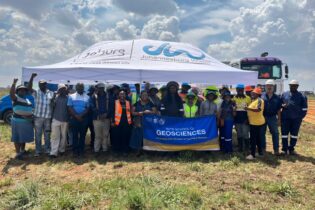By Mava Scott, head of communications for the Department of Water Affairs
Water plays a strategically important role in terms of its contribution to the South African economy. The reliable supply of water in sufficient quantities and to the required quality is a critical input to the country’s economic growth and job creation. In terms of its importance to the mining sector specifically, it also plays an integral role, underpinning one of the country’s most strategically important industry sectors. The mining sector uses around 2.5% of the national water supplies to sustain its activities and contributed 8.8% directly and 10% indirectly to South Africa’s GDP, creating around one million direct and indirect jobs. The sector accounts for approximately one third of the market capitalisation of the JSE, over 50% of merchandise exports (if secondary beneficiated mineral exports are counted), and it is also the major attraction for foreign investments. The NGP (New Growth Path) has set a potential employment target of 140000 new jobs by 2020 for the mining sector. In terms of South Africa’s Mineral Beneficiation Strategy, the government objectives with respect to mining focus not only on the mining of primary commodities, but also on significant contribution to the economy through beneficiation and mining tourism. In mining, water is an essential component to support a range of activities including mineral processing, dust suppression, slurry transport, and employee requirements. It plays an essential role in most mining and extractive processes, and today, responsible water use is a critical business issue for the mining sector as a whole in South Africa. In mining operations, the most important use of water is typically in mineral processing. Water is required in hydro-metallurgical processes (for example, to recover gold and copper from a solution of chemicals). Water is also required in pyro-metallurgical processes (for example, in platinum and copper production) for cooling and other parts of the process. Significant amounts of water may also be needed for dust control on haul roads and waste dumps. Among the challenges faced by the mining industry is the need to minimise water losses during processing while maximising water recycling. Today, it is unusual for a mine not to have recycle their water. Concerted efforts to save water in this way can have major benefits, both to the mining companies and also to the local communities in which they operate. Over the last several decades, the mining industry as a whole has made much progress in finding effective and innovative ways to maximise water conservation. Yet, at the same time, operations are often located in areas where there are not only significant competing residential, agricultural and industrial demands, but also very different perspectives on the role of water in local communities.The mining industry’s use of and impacts on water can result in a range of environmental, social and economic risks. Communities close to mine sites may be concerned about availability of water, security of their access to it and the potential for water contamination.
Now more than ever, mining companies are respecting the need to manage this critical resource and to introduce new initiatives for water conservation and management. Many mining companies are taking innovative approaches to finding sustainable solutions to water issues in this sector. Over and above managing potential impacts, mining companies can actually make a significant positive contribution to the provision of safe, clean supplies of water to neighbouring communities. Water sources often need to be shared by multiple users, while leaving enough water for ecosystem functioning. In most mining operations, water is obtained directly from groundwater rivers and lakes, or through commercial water service suppliers. The mining industry has found many innovative pathways to avoid competing with other users for water. For instance, mining companies sometimes have the capacity to invest in infrastructure to source water that can be of benefit to other users. Technology will continue to be developed to find innovative solutions to the challenges of obtaining water, reducing demand on water for mining processes and designing more efficient and effective means of water management and treatment. Many mining companies are committed to technological research, innovation and development to increase business efficiency and good water practice. As such factors as climate change, population growth, and essential economic development continue to increase water demand in South Africa, then mining companies, together with business and industry throughout the country, are looking to improve their performance in water management through increased efficiency, technological innovation, and sharing of good practice. Going forward, it is important stakeholders understand the mining sector’s strategic importance to the growth and development of South Africa on the global economic stage. Source: The New Age






